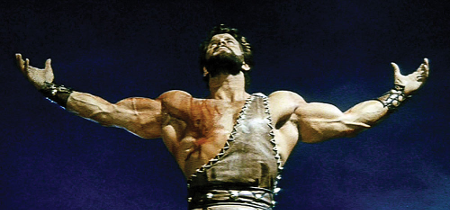29 Apr 2015
Hercules vs Vampires: Film Becomes Opera!
In the early sixties, Italian film director Mario Bava was making pictures with male body builders whose well oiled physiques appeared spectacular on the screen.

In the early sixties, Italian film director Mario Bava was making pictures with male body builders whose well oiled physiques appeared spectacular on the screen.
Composer Patrick Morganelli was already a Bava fan when Opera Theater Oregon chose him to create music for a live performance featuring a Bava film. The first version of Hercules vs Vampires premiered in May 2010. For the accomplished singers of L A Opera’s Young Artist Program in 2015, Morganelli reworked the vocal parts and made them more technically demanding.
In the early sixties, Italian film director Mario Bava was making pictures with male body builders whose well oiled physiques appeared spectacular on the screen. Composer Patrick Morganelli was already one of Bava’s fans in 2009 when Opera Theater Oregon (OTO), a small but adventurous company based in Portland chose him to create music for a live performance featuring a Bava film. The first version of Hercules vs Vampires premiered at OTO in May 2010. For the more accomplished singers of L A Opera’s Domingo-Colburn-Stein Young Artist Program, Morganelli reworked the vocal parts and made them more technically demanding.
Because each utterance has to fit into the time that the filmed character is seen saying it, the number of words in the libretto had to be cut by about two-thirds. Still, the libretto text had to convey the same meaning as the spoken dialogue, so Morganelli, who did this work himself, had a time-consuming job. Conductor Christopher Allen, an alumnus of the LA Opera Young Artist Program, saw to it that the music fit the filmed speeches. Because of the format, he was not able to allow the singers to hold the notes on which their voices sounded best for even a beat longer than what was written in the score.
 Reg Park as Hercules
Reg Park as Hercules
In the story, Hercules’s sweetheart, Dianara, was the rightful queen of Acalia, but her evil uncle, Lycos, put a spell on her and stole her throne. Hercules consulted an oracle that told him a magic stone from Hades would free her. He would also need a golden apple to assure his safe return to earth. Boiling lava and a powerful storm at sea tested Hercules and his friend, Theseus, who were played on the screen by Reg Park and George Ardisson. When they arrived at Acalia, they found it in chaos. One reason for the trouble was that Persephone, the daughter of Pluto, had fallen in love with Theseus and overstayed the time she was allowed to visit earth. Theseus loved her and fought with Hercules but when she realized she was the cause of trouble, she went back to Pluto’s realm.
Lycos wanted to drink all of Dianara’s blood but Hercules saved her only to find himself besieged by the undead in every imaginable form. This fight music is some of Morganelli’s best and I imagine it could be made into a short orchestral piece that could stand alone.
Morganelli said he differentiated between music for Hades and Earth. Earth was more accessible and impressionistic, while Hades was described by hard-edged and atonal phrases. Thus, Summer Hassan as Dianara sang more lyrical music than Vanessa Becerra as Zarathusa and Medea. It was Becerra’s pure toned, clean coloratura that made her stand out as an artist to watch for in the future, however.
At first I wondered why Hercules was a baritone instead of a heldentenor. Then I heard Kihun Yoon! He had the virile, resonant tones needed for a strongman. As Theseus, Frederick Ballentine sang with burnished bronze sounds that portrayed Hercules’s more romantic friend. Mezzo-soprano Lacey-Jo Benter sang passionately with a particularly opulent middle register that offered a pleasant contrast to the two sopranos.
Nicolas Brownlee was a malevolent Lycos whose evil was apparent to the audience long before it was to Hercules. Bass-baritone Craig Colclough’s vigorous, dark-voiced characterizations of Procrustes and the God of Evil completed the opposition to Hercules and Dianara. Maestro Allen held his twenty-six-player orchestra in a tight mold because of film timings, but he also drew translucent and harmonically effective music from them. This was a most intriguing experiment that might well be tried with another film. It will be interesting to see what happens with this brand new genre in the future.
Maria Nockin
Cast and production information:
Lycos, Nicholas Brownlee; Henchman/Kyros/Peasant, Brenton Ryan; Hercules, Kihun Yoon; Dianara/Hesperide/Peasant/City Woman, Summer Hassan; Medea/Zarathusa/Chained Woman/Helena, Vanessa Becerra; Theseus, Frederick Ballentine; Telemachus/City Man/Palace Attendant, Rafael Moras; Procrustes/God of Evil, Craig Colclough; Conductor, Christopher Allen.